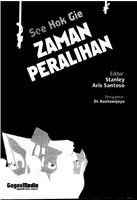 First published in The Jakarta Post, August 28, 2005
First published in The Jakarta Post, August 28, 2005SOE HOK GIE: AN UNSHAKABLE IDEALIST OF HIS TIME
Alpha Amirrachman, Contributor, Jakarta
During his short-lived career as an intellectual, Soe Hok Gie (1942-1969) meticulously recorded the dramatic transition of this nation from Sukarno's regime to Soeharto's New Order.
Born the son of writer Soe Lie Piet, or Salam Sutrawan, Gie, both as a student activist and history lecturer at the Faculty of Letters, the University of Indonesia, wrote prolifically and published numerous critical articles in national newspapers, mostly on political and nation-building issues.
Zaman Peralihan (The transitional era) is a compilation of 41 articles written by Gie between 1967 and 1969, edited by Stanley and Aris Santoso and with a preface from prominent historian Dr. Kuntowijoyo.
Recently, the biopic Gie, directed by Riri Riza and produced by Mira Lesmana, was released. This movie, while it helps us in envisaging his modest and heartrending short life, it is still inadequate in doing him justice without reading his real work.
What is most striking, perhaps, is his unmatched spirit of nationalism, his blunt rebellion against injustice and corruption -- which alone was enough to earn him enemies -- and although he was an Indonesian of Chinese descent, he refused to change his Chinese name into an Indonesian one. His brother Soe Hok Djien changed his to Arief Budiman.
From the outset, it is obvious that Soe struggled to position himself beyond all ideologies, an untainted intellectual who would "bark" at anybody he considered either politically or morally corrupt, or both.
He read numerous books, including those by Karl Marx and Frederick Engels; nevertheless, he was against the way the Indonesian Communist Party (PKI) allegedly exploited the poor for political gains that would benefit the party's elite.
During the volatile period when Sukarno campaigned rigorously to impose Nasakom -- a "forced" marriage among nationalism, religion and communism-the sentiment between the army and communists was ever more fractious. Disgusted with Sukarno's increasingly erratic style of ruling the country, Gie, along with many other students, became involved in demonstrations to demand a change in regime.
But this marked the beginning of the long-term bloody honeymoon between members of the University of Indonesia and the military. This shows how shrewd Soeharto was in taming the most strategic section of society: the intellectuals.
In this, Gie became deeply disillusioned with many of his friends who had been so easily lured by the new establishment. Gie decided instead to become a university lecturer and to continue to reflect upon his encounters with the bitter political reality through his writing.
In "Di Sekitar Pembunuhan Besar-besaran di Pulau Bali" (About the large-scale massacre on Bali Island), he was the first to blow the whistle on the massacre, which claimed around 80,000 lives on the paradise isle. He said that the mass killing was not purely communist cleansing, as it was also a case of "saving ourselves first", as those who had been staunchly pro-Nasakom -- or nationalism, religion and communism -- were now those who were campaigning to kill the "communists".
Gie could not hide his shock realizing the atrocious brutality which followed the purge of the Indonesian Communist Party (PKI). In "Surat Bebas PKI" (A letter certifying non-association with the PKI), he deplored the excessive policy of the New Order regime that created an undue PKI-phobia, as even young children needed to have an official letter proving they were "free of communist elements".
He also began to feel uncomfortable, as he had been part of the moral force that had pushed for the birth of the New Order.
Indeed, as Dr. Kuntowijoyo writes in the preface, while Gie might have died too young for history to judge his enduring idealism thoroughly (his accidental death was caused by inhaling poisonous gas during a climb on Mt. Mahameru), compared with his peers, Gie was indisputably one who adhered strictly to his principles.
Credit should go to editors Stanley and Aris Santoso, whose efforts makes it possible for us to reflect that if Gie were still alive today, he would have -- for the second time -- seen a student movement become gravely fragmented and many, though not all, once prominent student activists trade in their precious idealism for short-term cooperative positions.
Equally important, Zaman Peralihan also celebrates a recognition that a spirit of nationalism can burn so brightly in the mind and deeds of a young Chinese-Indonesian, a member of an ethnic minority group that often suffered from discriminatory treatment under the New Order.
No comments:
Post a Comment